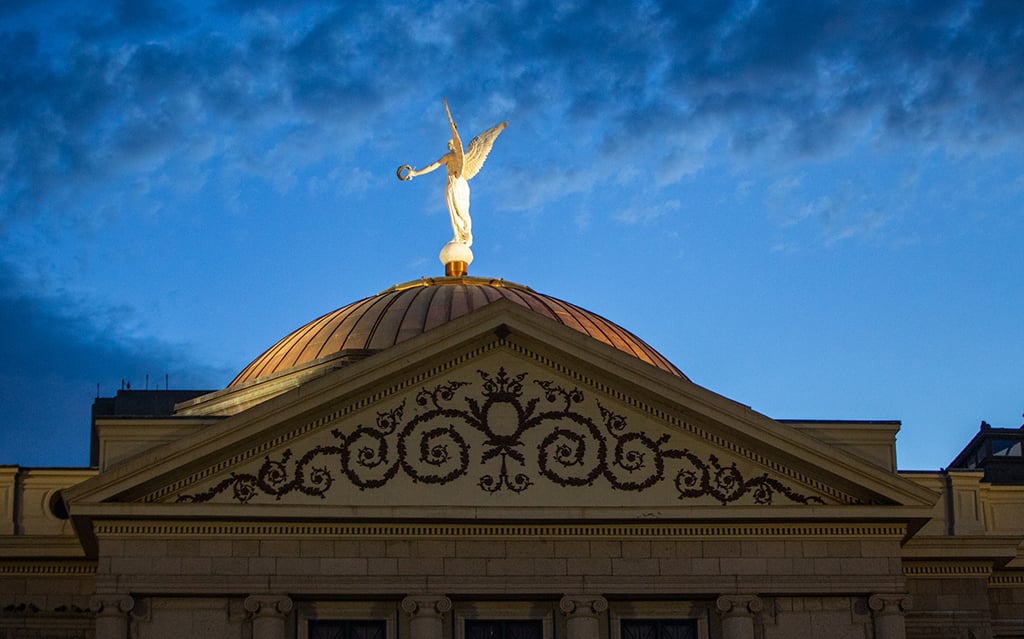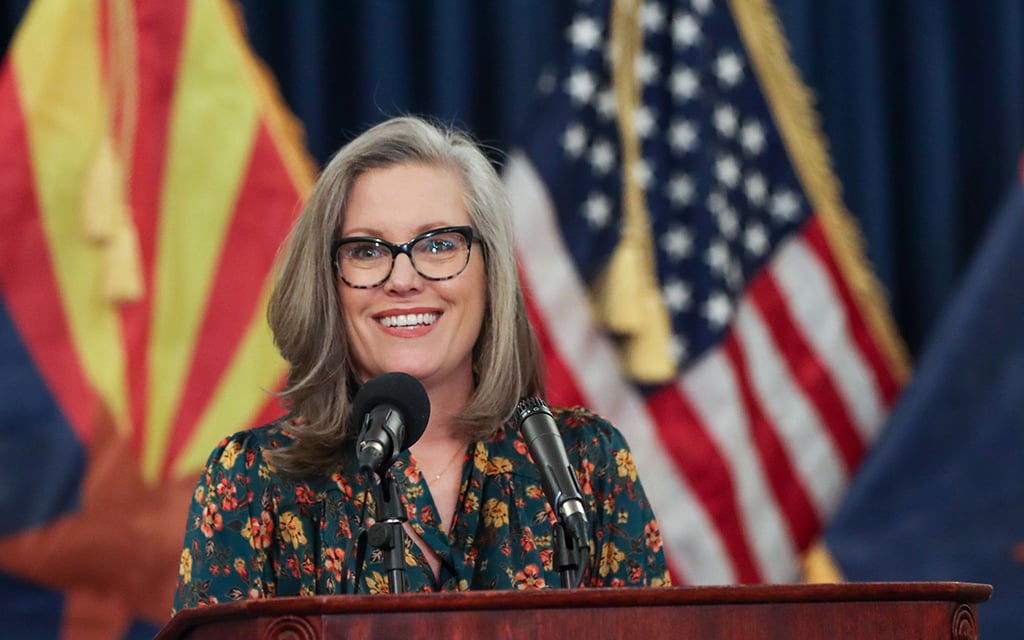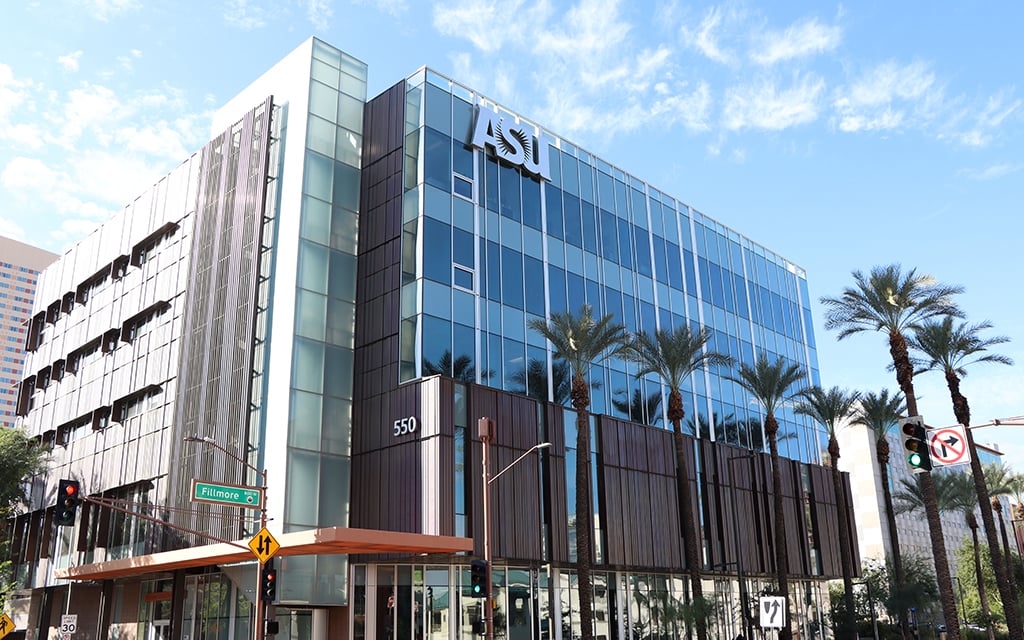
After a budget cycle last year when they were flush with cash, Arizona lawmakers now face a revenue shortfall of more than $800 million for fiscal years 2024 and 2025. Gov. Katie Hobbs’ proposed $16 billion budget for fiscal 2025, released Friday, is already facing GOP opposition and is the first step in what is expected to be a bitter budget debate. (File photo by Ellen O’Brien/Cronkite News)
PHOENIX – Gov. Katie Hobbs unveiled a $16.3 billion budget proposal Friday for fiscal 2025 that would close a projected $889 million revenue shortfall by cutting transportation projects and sharply reining in the state’s Empowerment Scholarship Accounts.
Those cuts and others, if approved, would clear the way for Hobbs to fund $488 million in new initiatives, including investments in child care support, prisons, housing and public education.
But bipartisan support seems unlikely. The Republican chairmen of the House and Senate Appropriations committees were already blasting the proposal Friday afternoon, with Rep. David Livingston, R-Peoria, calling it an “unserious mess.”
That was echoed by Sen. John Kavanagh, R-Fountain Hills, who said in a joint statement with Livingston that, “These elements in her proposal are dead on arrival with the Republican Majority.”
But Democrats in the Legislature focused on the investments in the proposal and blamed Republicans for the looming revenue shortfall.
“We applaud the Governor for producing a budget that protects the priorities that will drive our state forward and that our caucus has consistently championed for our communities,” said House Minority Leader Lupe Contreras, D-Cashion, in a written statement. “Decades of irresponsible Republican tax policies and expansion of ESA vouchers with no oversight have created a revenue shortfall that appears to be ballooning.”
Hobbs’ proposal to reform the universal ESA voucher program drew the sharpest reactions. Under the program, any family in the state can get a voucher – averaging about $7,000 per student – to help pay for their child’s private education.

Gov. Katie Hobbs, shown in a 2023 file photo, said her fiscal 2025 budget plan cuts “wasteful taxpayer spending while making critical investments.” Opponents called it an “unserious mess.” (File photo by Emily Mai/Cronkite News)
In theory, the program saves the state money because it no longer has to pay for that student’s public schooling. But in practice, many of the students who have signed up had not attended public school in the first place. If unchecked, Hobbs’ budget said more than 83,000 students could be enrolled in the ESA program next year, costing the state $822 million in fiscal 2025.
The budget would change the program by restricting enrollment to students who have attended public school for at least 100 days. Hobbs has also proposed eliminating prior-year eligibility. Those changes would disqualify about 49,500 ESA students who were not previously enrolled in public schools, saving the state an estimated $244 million.
But House Speaker Ben Toma said Monday in a video posted Monday on X, the site formerly known as Twitter, that he will “not allow anything that would roll back or limit the ESA program.”
Hobbs also wants to eliminate an income tax credit for donations to School Tuition Organizations, which provide scholarships for students to attend private schools in Arizona. She said that would save the state $185 million in fiscal 2026.
The budget would also save hundreds of millions of dollars by delaying noncritical capital projects and imposing a one-time 1% cut on the executive and legislative operating funds, among other proposals. That includes $418.6 million that would be saved by recovering unused money from some transportation projects.
“We are cutting out the wasteful taxpayer spending while making critical investments that will help middle class families buy a home, expand access to childcare, make prescription drugs more affordable, and protect disabled Arizonans and seniors,” Hobbs said in a written statement.
Among the initiatives Hobbs hopes to fund are $100 million to support the Child Care Assistance Program that helps cover child care expenses for low-income families. The budget proposal also includes $183 million for school renovations and $200 million for higher education.
That includes almost $46 million for the Arizona Healthy Tomorrow Initiative: $21.2 million for new technology-oriented medical school at Arizona State University, $10 million to help Northern Arizona University create a school of medicine and $14.7 million for the University of Arizona to expand its medical school.
“With the Governor and legislators, we are committed to working together to advance this initiative as well as other opportunities to increase access for Arizona students, including the Arizona Promise Program,” said Arizona Board of Regents Chair Fred DuVal in a written statement.
The budget also includes $203 million to help the Department of Corrections, Rehabilitation and Reentry meet court-ordered improvements to inmate health care. It would fund the hiring of 84 new employees and supplement increased costs of food for inmates and private prison contracts.
The administration said the state’s economic outlook is sound but that the budget is based on a “cautious revenue picture.” But Hobbs’ outlook is more optimistic than the latest estimates from the Joint Legislative Budget Committee, which projected an $835 million revenue shortfall in fiscal 2024 in its fiscal 2025 baseline book released Friday.
JLBC blamed the reduced revenue on the phasing in of the 2.5% flat income tax rate that took effect last year, and a new income tax rebate program that is expected to cost $13 million more than expected. The report predicts net revenues of $15.35 billion for fiscal 2025, compared to Hobbs’ $16.3 billion budget for year.

